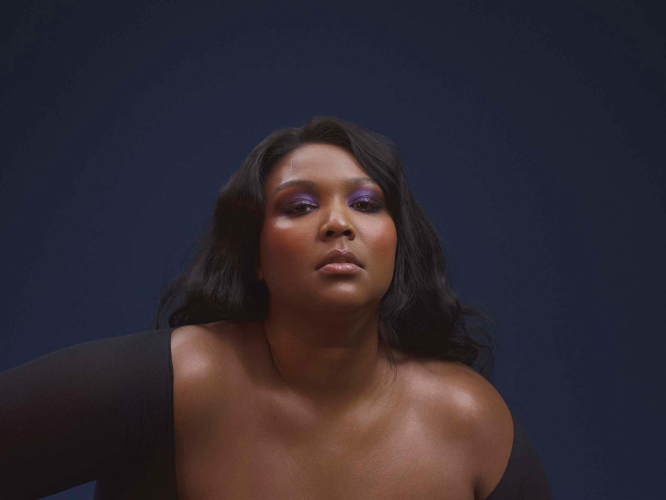
Lizzo
Earlier this year, America’s favorite self-loving, twerking flautist took to social media to share a hard truth with her fans. “I’m depressed and there’s no one I can talk to because there’s nothing anyone can do about it,” Lizzo wrote in an Instagram post on June 20. “Life hurts.”
Many of Lizzo’s millions of followers were taken aback by her vulnerability. In January, the magnetic performer’s career exploded like a million-gallon vat of Diet Coke with a ton of Mentos dropped inside when she released “Juice,” the lead single from her full-length Cuz I Love You, which came out in April. At the time she made the post, Lizzo was topping the charts, selling out tour dates in seconds and collaborating with Missy Elliott, Ariana Grande and Justin Timberlake. (And Rihanna has called dibs on a future project — swoon!)
To hear that someone like Lizzo has bad days (or even weeks, months or years) was both surprising and comforting to many people. Commenters showered the singer with love, of course, but many fans also shared their own stories of how depression, anxiety and other mental illnesses have affected them. The next day, Lizzo posted an update.
“I learned in the last 24hrs that being emotionally honest can save your life,” she wrote. “Reaching out may be hard but as soon as I did, I was immediately covered in love.”
No one is immune to experiencing symptoms of mental illness. Not you, not me, not even a woman who has cultivated a ride-or-die fan base of millions, built on encouraging anyone and everyone to love themselves shamelessly and endlessly. According to research collected by the National Alliance on Mental Illness, 1 in 5 adults and 1 in 6 children ages 6-17 experience mental illness every year — but only 43.3 percent of those adults and 50.6 percent of those children received treatment in 2018.
Our national conversation around mental health has made strides in recent years, with several high-profile celebrities and public figures sharing their experiences in an effort to undo harmful stigmas. But there’s still much room for improvement. On Saturday, Lizzo returns to Nashville — for the third time this year, and the first since landing eight Grammy nominations — to continue the important discussion about mental health. She’ll headline Live. Life. Love., pop radio station 107.5-FM The River’s third annual concert for suicide prevention, which also features Jon Bellion, Louis Tomlinson, Lovelytheband and Chelsea Cutler.
The benefit concert, which raises money for the national mental health advocacy organization To Write Love on Her Arms (twloha.org), was established in 2017. Earlier that year, Metro police Officer Eric Mumaw drowned in the Cumberland River while trying to save a woman who was attempting to end her life.
“Everybody [at the station] already had a special place in their heart for suicide prevention and mental health awareness, because we know it’s an unbelievable problem,” says Jim Chandler, co-host of The River’s morning show Woody and Jim. “But there was something about that that struck us all as: ‘Wow, somebody was in that horrible place that we’ve all talked about amongst ourselves, and then somebody who was trying to do the right thing ended up losing their life.’ There was something about that that said, ‘You know, we’ve got to do something, we’ve got to have this conversation on a regular basis with our listeners and the community.’ ”

Louis Tomlinson
Struggles with mental health hit close to home for other performers on the Live. Life. Love. bill. Louis Tomlinson became a global pop star as one-fifth of the U.K. boy band One Direction, and he has also been outspoken about the ways in which his life has been affected by mental illness. Tomlinson’s mother, Johannah Deakin, died of leukemia in 2016. In March, his 18-year-old sister Félicité died of an accidental drug overdose, and it was reported that she’d started using drugs to cope with Deakin’s death. “After I lost my mum, every song I wrote felt, not pathetic, but that it lacked true meaning to me,” Tomlinson told The Guardian in a September conversation involving “Two of Us,” a song he’d written about Deakin. “I felt that, as a songwriter, I wasn’t going to move on until I’d written a song like that.”
Chandler highlights the taboo around discussing mental health and the danger that poses, recalling a friend who was vocal about his struggles with depression — and how much better he felt after receiving treatment. That experience helped Chandler recognize his own symptoms.
“It took me a good solid month to remember what my friend said when he spoke up,” says Chandler. “I’m like: ‘Oh my God, the same thing is happening to me. These are all the things he told me about.’ Had he not done that, I don’t know that it would have occurred to me. It righted my ship and got me out of what luckily was only a few months of a pretty bad time.”
The first two installments of Live. Life. Love. raised $36,000 for To Write Love on Her Arms, and the station hopes this year’s concert will double that number. But more important than the money is the space that a big public event like this makes for those who may be suffering, or know someone who is.
“We’ll get you through this,” says Chandler. “Almost everybody’s been through something. It will improve. There are steps you can take. You’re worthy. You matter.”
If you or someone you know is struggling, please reach out — help is available. Here are some good places to start.
National Alliance on Mental Illness — TennesseeHelpline: 1-800-467-3589
Tennessee Association of Mental Health Organizations
Crisis Line: 1-855-274-7471
Mental Health Cooperative
Crisis Team: 615-726-0125 or 1-855-274-7471
No cost walk-in crisis care available 24 hours a day, seven days a week at 250 Cumberland Bend Drive in MetroCenter.
National Suicide Hotline
1-800-273-TALK (8255)
To Write Love on Her Arms
Crisis Text Line: Text TWLOHA to 741741






